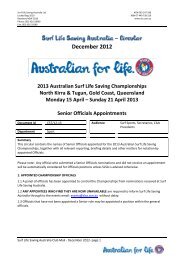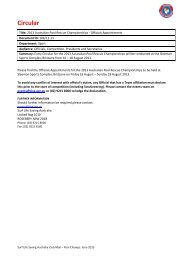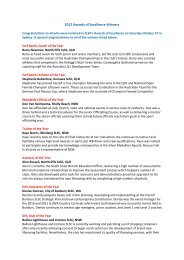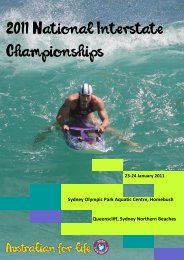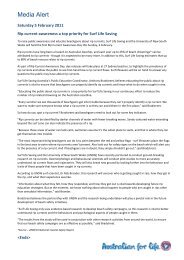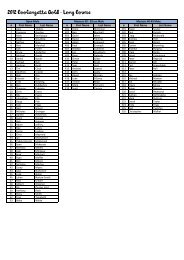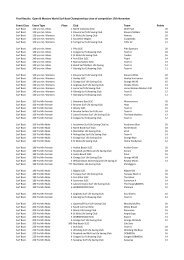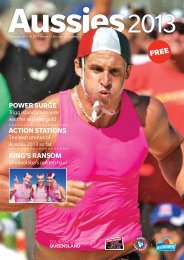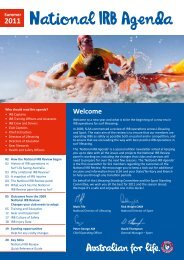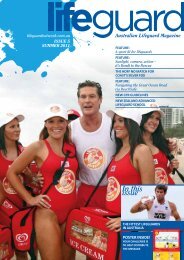Mental Preparation for Officials - Concentration & Self-Reflection
Mental Preparation for Officials - Concentration & Self-Reflection
Mental Preparation for Officials - Concentration & Self-Reflection
Create successful ePaper yourself
Turn your PDF publications into a flip-book with our unique Google optimized e-Paper software.
Michael Lloyd<br />
Psychological Consulting<br />
<strong>Mental</strong> <strong>Preparation</strong> <strong>for</strong><br />
<strong>Officials</strong> - <strong>Concentration</strong> &<br />
<strong>Self</strong>-<strong>Reflection</strong><br />
SLSA Coach & Official Conference<br />
Jupiter’s Hotel and Casino<br />
4 th April 2011<br />
Presenter: Michael Lloyd
Understanding Optimal<br />
Per<strong>for</strong>mance<br />
Michael Lloyd<br />
Psychological Consulting<br />
• The 4 Elements of Optimal<br />
Per<strong>for</strong>mance:<br />
‣ Physical<br />
‣ Technical<br />
‣ Tactical<br />
‣ <strong>Mental</strong><br />
• The Mind Complimenting and<br />
Enhancing the Body<br />
(c) Michael Lloyd 2011
<strong>Mental</strong> <strong>Preparation</strong> &<br />
Optimal Per<strong>for</strong>mance<br />
Michael Lloyd<br />
Psychological Consulting<br />
Perceived Perceived Potential <strong>for</strong><br />
Demand Ability Optimal Per<strong>for</strong>mance<br />
(c) Michael Lloyd 2011
Managing the<br />
Demand<br />
• The Per<strong>for</strong>mance Shopping List…Creating Certainty &<br />
Excuse Free Per<strong>for</strong>mance:<br />
‣ Do I know what to do?<br />
‣ Do I know how to do it?<br />
‣ Do I know when to do it?<br />
‣ Do I have the resources & ability to do it?<br />
‣ Do I want to do it?<br />
Michael Lloyd<br />
Psychological Consulting<br />
‣ Am I doing everything I possibly can in order to be successful?<br />
(c) Michael Lloyd 2011
Creating the Ability<br />
• Setting Clear Goals<br />
‣S.M.A.R.T<br />
‣Long Term & Short term<br />
‣Process Oriented<br />
‣In the moment<br />
‣Consistent with Values<br />
‣Acknowledge Success<br />
Michael Lloyd<br />
Psychological Consulting<br />
(c) Michael Lloyd 2011
Creating Optimal<br />
Per<strong>for</strong>mance<br />
• <strong>Self</strong>-Awareness & Role Intellect<br />
Michael Lloyd<br />
Psychological Consulting<br />
– Know your role (i.e., what works, what doesn’t and<br />
what changes) and show commitment<br />
– Model correct attributions<br />
– Use effective self-talk (clear, direct, affirming)<br />
– See yourself executing successfully<br />
– Manage your activation levels (energising or<br />
relaxing)<br />
– Manage your attention and concentration<br />
– Act with intent<br />
(c) Michael Lloyd 2011
<strong>Concentration</strong> & Elite<br />
Per<strong>for</strong>mance<br />
Michael Lloyd<br />
Psychological Consulting<br />
Elite officials:<br />
• Are less likely to become distracted by irrelevant factors;<br />
• Maintain a more task-oriented attentional focus;<br />
• Develop exceptional concentration abilities appropriate to<br />
their sport.<br />
• Are absorbed in the present;<br />
• Are mentally relaxed and have a high degree of<br />
concentration and control; and<br />
• Report a state of extraordinary awareness of both<br />
themselves and the external environment.<br />
(c) Michael Lloyd 2011
<strong>Concentration</strong> & Elite<br />
Per<strong>for</strong>mance<br />
• <strong>Concentration</strong> is NOT an all-or-nothing phenomenon.<br />
• Various types of attentional focus are appropriate <strong>for</strong><br />
specific sports and activities.<br />
• Research (Nideffer, 1976; 1981) on the role of<br />
attentional style in sport views attentional focus along<br />
two dimensions:<br />
– width (broad or narrow), and<br />
– direction (internal or external)<br />
Michael Lloyd<br />
Psychological Consulting<br />
• By combining width and direction of attentional focus,<br />
four different categories emerge, appropriate to<br />
various situations and sports.<br />
(c) Michael Lloyd 2011
<strong>Concentration</strong> &<br />
Optimal Per<strong>for</strong>mance<br />
External<br />
Michael Lloyd<br />
Psychological Consulting<br />
Broad-external<br />
Narrow-external<br />
Broad<br />
•Peripheral awareness<br />
•Ability to read and react to the<br />
environment<br />
•Scanning<br />
•Required in open-skill sports<br />
•Focused targeting<br />
•Block out distractions<br />
•Remain focused on Target<br />
Narrow<br />
Broad-internal<br />
Narrow-internal<br />
•Analysis<br />
•Problem solving<br />
•Planning<br />
•Creative thinking<br />
•Focus on a single thought or idea<br />
•Enhanced body awareness<br />
•Following instructions<br />
•Sticking to a game plan<br />
Internal<br />
(c) Michael Lloyd 2011
Shifting Attentional<br />
Focus<br />
Michael Lloyd<br />
Psychological Consulting<br />
• Given these four attentional categories, it is not<br />
uncommon, and often necessary <strong>for</strong> officials to adopt<br />
different <strong>for</strong>ms of attentional focus during different<br />
aspects of per<strong>for</strong>mance. For example:<br />
– Broad External (e.g., monitoring a number of<br />
competitors or crafts through the break)<br />
– Narrow External (e.g., focusing on a specific<br />
competitor)<br />
– Broad Internal (e.g., analysing and event planning)<br />
– Narrow Internal (e.g., making a specific decision)<br />
(c) Michael Lloyd 2011
<strong>Concentration</strong> &<br />
Attentional Problems<br />
• Most officials recognise that they have difficulties<br />
concentrating <strong>for</strong> the duration of a per<strong>for</strong>mance (or<br />
at specific times).<br />
• Usually, concentration difficulties are caused by<br />
inappropriate attentional focus or an ‘attentional<br />
mismatch’.<br />
Michael Lloyd<br />
Psychological Consulting<br />
• Rather than focusing on appropriate cues, officials<br />
become distracted by thoughts, other events, and<br />
emotions.<br />
• These distractions can be both internal and external<br />
in nature.<br />
(c) Michael Lloyd 2011
Internal Distracters<br />
• Living in the past<br />
• Worrying about the future<br />
• <strong>Self</strong>-talk<br />
• Increased arousal and state anxiety<br />
• Choking<br />
• Fatigue<br />
• Pain/discom<strong>for</strong>t<br />
Michael Lloyd<br />
Psychological Consulting<br />
• Hunger & dehydration<br />
(c) Michael Lloyd 2011
External Distracters<br />
Michael Lloyd<br />
Psychological Consulting<br />
• Visual distracters<br />
– Crowd, media, environment, etc.<br />
• Auditory distracters<br />
– Crowd noise, PA system, environment, etc.<br />
• Physical interactions<br />
– Athletes, team officials, weather<br />
conditions, etc.<br />
(c) Michael Lloyd 2011
Strategies <strong>for</strong> Improving<br />
<strong>Concentration</strong><br />
Michael Lloyd<br />
Psychological Consulting<br />
• Simulation training (including imagery)<br />
• Cue words<br />
• Positive self-talk<br />
• Mindfulness and non-judgemental thinking<br />
• ‘Parking’ thoughts<br />
• Per<strong>for</strong>mance routines<br />
• Staying in the present<br />
(c) Michael Lloyd 2011
<strong>Concentration</strong> Exercises<br />
• Shifting attention (internal/external,<br />
broad/narrow)<br />
• <strong>Concentration</strong> grids, puzzles, sudoku<br />
• Playing video/computer games<br />
• Clock face exercises<br />
• Mindfulness exercises<br />
Michael Lloyd<br />
Psychological Consulting<br />
(c) Michael Lloyd 2011
Creating Optimal<br />
Per<strong>for</strong>mance<br />
Michael Lloyd<br />
Psychological Consulting<br />
• Per<strong>for</strong>mance Routines<br />
1. Identifying each aspect of your role<br />
2. Positive self-talk/encouragement<br />
3. Images of perfect execution<br />
4. <strong>Self</strong>-regulation (physical and emotional)<br />
5. Execution (and related cues)<br />
(c) Michael Lloyd 2011
Per<strong>for</strong>mance Analysis<br />
and <strong>Self</strong>-<strong>Reflection</strong><br />
• Date<br />
• Competition<br />
• Role/s & Per<strong>for</strong>mance Focus<br />
• What went well<br />
Michael Lloyd<br />
Psychological Consulting<br />
• What could I improve (+ what was missing)<br />
• What did I learn about myself and/or my<br />
role/ the competition/environment<br />
• General comments<br />
(c) Michael Lloyd 2011
Questions?<br />
Michael Lloyd<br />
Psychological Consulting<br />
(c) Michael Lloyd 2011



